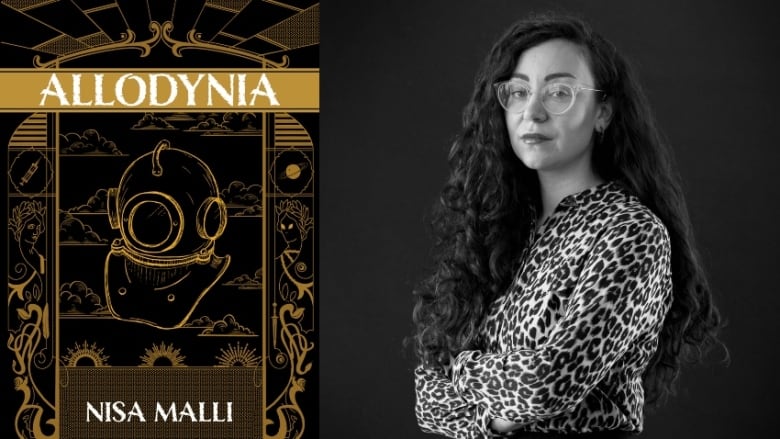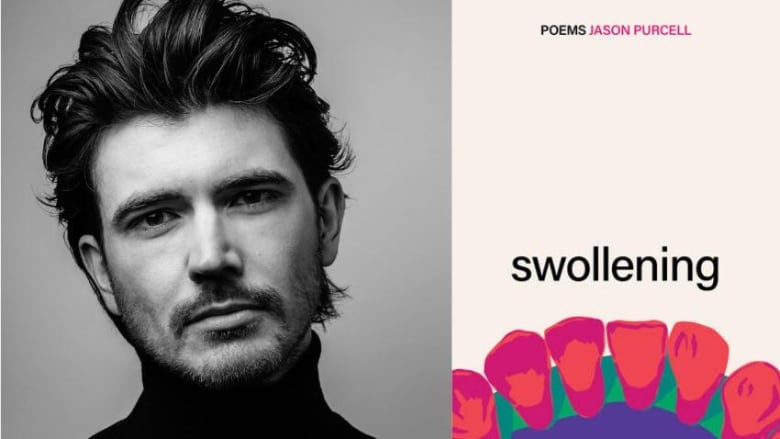22 debut Canadian poetry collections to read for National Poetry Month
April is National Poetry Month! Check out this list of 22 debut poetry collections from emerging writers published over the past year.
Dream of No One But Myself by David Bradford

Dream of No One but Myself is a poetry collection that combines prose poems, verse and collages of family photos cut-up to showcase what it was like growing up in a troubled family. In Dream of No One but Myself, David Bradford presents an unstable, frayed account of family inheritance, intergenerational traumas and domestic tenderness.
Bradford is a poet, editor and organizer based in Montreal. His work has appeared in The Capilano Review, The Tiny, The Fiddlehead, Carte Blanche and elsewhere. He is a founding editor of House House Press.
[SQUELCH PROCEDURES] by MLA Chernoff

[SQUELCH PROCEDURES] employs the language of internet memes, popular culture and philosophers to examine healing in the aftermath of trauma. MLA Chernoff's "pomes" suggest that healing is often misconstrued for other things — such as avoidance, dependence and regression.
MLA Chernoff is a poet based in Toronto. They have also published two chapbooks: delet this and Terse Thirsty. Chernoff's work has been published in The Bad Dog Review, Peach Mag, Trash Magazine and other publications.
Danger Flower by Jaclyn Desforges

Danger Flower evokes the cautionary nature of fairy tales, calling upon uncanny images of lush gardens, nesting dolls and Tamagotchis, as the poems navigate gender, sex and motherhood in a dangerous and evolving world. Jaclyn Desforges infuses her poetry with sensation, sometimes painful, sometimes pleasurable and sometimes both at once.
Desforges is a poet and picture book author. She has won the 2018 RBC/PEN Canada New Voices Award and the 2020 Hamilton Emerging Artist Award for Writing. Her work has been featured in Room Magazine, The Fiddlehead and The Puritan. She lives in Hamilton, Ont.
Harbour Grids by Zane Koss

Harbour Grids is a long poem in four parts that investigates ideas of community and belonging. The poem explores issues of labour, location, history, belonging, subjectivity and how we experience the world we live in. It draws on the work of poets Daphne Marlatt, Fred Wah, Nasser Hussain and Jordan Abel.
Zane Koss is a poet, translator and scholar. He has published several chapbooks. Koss teaches and researches Canadian, Mexican and American poetry of the 1960s and 1970s at New York University.
The Language We Were Never Taught To Speak by Grace Lau

The poems in The Language We Were Never Taught To Speak are a form of therapy that, according to Lau, few Chinese Canadians ever get to experience. It delves into the shapes that love and apologies take: the eternal debt one takes on knowing they'll never be able to repay their parents, the coming out journey in a traditional household and the never-ending task of trying to better understand the perspectives of your elders.
Grace Lau was raised in Vancouver and currently lives in Toronto. The Language We Were Never Taught to Speak is her first poetry collection.
Hsin by Nanci Lee

Born to a Syrian father and a Chinese mother who gave her up for adoption, Nanci Lee reflects on her origins. Hsin arises from an ancient Chinese ethical philosophy and explores fourth-century poet Su Hui's palindrome of longing.
Nanci Lee is a Chinese Syrian poet based in Nova Scotia. Her writing has appeared in publications like The Malahat Review, Matrix Magazine, The Antigonish Review and The Literary Review of Canada.
Occasionally Petty by Michelle Lietz

When Michelle Lietz heard that Tom Petty died, she felt a piece of her past break away. Using lyrics from Petty's songs, Lietz launches an exploration on nostalgia, adolescence and her mixed Yaqui, European and Middle Eastern identity.
Michelle Lietz is an Indigenous American author of mixed Yaqui, European and Middle Eastern descent. Her writing has been published in Prairie Fire's NDN City issue.
Allodynia by Nisa Malli

Allodynia reflects on themes of alienness, artificial intelligence, danger, intimacy and war. These poems look outward to space and the future of humankind, as well as inward to the body, and are rooted in the indescribability of pain.
Nisa Malli is a researcher and writer from Winnipeg. Her chapbook, Remitting, won the bpNichol Prize and her work has been nominated for a Rhysling Award.
Me, You, Then Snow by Khashayar Mohammadi

Me, You, Then Snow brings together creative and diverse poems, all inspired by memories, dreams and desires. The collection is an exploration of our desire to connect with and communicate with the world around us.
Mohammadi is a poet and translator from Iran who now lives in Toronto.
Land of the Rock by Heather Nolan

Land of the Rock: Talamh an Carraig is an exploration of belonging in a lost ancestral culture. Moving through Newfoundland and Ireland, these poems look for meaning in words, places and behaviour. Whether the subject is tourists on Fogo Island or the landscape of the Burren, Gaelic Ireland is reimagined and displaced across the Atlantic.
Heather Nolan is a writer and photographer from St. John's, Newfoundland. She is the author of the novella This is Agatha Falling, which was shortlisted for the ReLit Award.
The Junta of Happenstance by Tolu Oloruntoba

Tolu Oloruntoba released his debut collection, The Junta of Happenstance, last May and promptly won the 2021 Governor General's Literary Award for poetry. Less than a year later, he's already out with one of the most anticipated collections of the year, Each One a Furnace.
The Junta of Happenstance is an exploration of disease, both medical and emotional. It explores family dynamics, social injustice, the immigrant experience, economic anxiety and the nature of suffering.
Oloruntoba lives in B.C. He is the founder of the literary magazine Klorofyl and author of the chapbook Manubrium, which was shortlisted for the 2020 bpNichol Chapbook Award.
Swollening by Jason Purcell

In Swollening, Jason Purcell contemplates the intersection of queerness and illness. Part memoir, these poems explore what it's like to live in a homophobic world as a queer person. From heteronormativity to anxiety around desire and internalized homophobia, Purcell wonders how a sick, queer body living in a sick world moves toward hope.
Purcell is a writer and musician currently living in Edmonton, where they are also the co-owner of Glass Bookshop.
sulphurtongue by Rebecca Salazar

The wide array of poems in sulphurtongue explores how we create our identities and how they collide with and complicate each other. They take on the relationships to family, desire, religion, the land, politics, trauma and the natural world — and how these things shape who we are.
Sulphurtongue was on the shortlist for the 2021 Governor General's Literary Award for poetry.
Salazar is a writer, editor and community organizer from New Brunswick. They edit the publications The Fiddlehead and Plenitude.
None of this Belongs to Me by Ellie Sawatzky

Ellie Sawatzky's debut collection is a contemplation of girlhood and coming-of-age, of moving from a space of innocence to experience. Concerns range from the worldly — climate change and economy — to the personal and intimate — ex-lovers, ancestral ghosts and girls called Emily.
Ellie Sawatzky is a writer from Kenora, Ont., now based in Vancouver. She was a finalist for the 2019 Bronwen Wallace Award for Emerging Writers and has been published in The Fiddlehead, PRISM International, Best Canadian Poetry and many other publications. She was longlisted for the 2019 CBC Short Story Prize.
rump + flank by Carol Harvey Steski

Carol Harvey Steski's collection, rump + flank, explores the body in nature's many incarnations: human, animal, plant, microbe, even chemical. Her poetic work sheds light on what bodies — especially female ones — endure, probing the full range of experiences from pleasure and hope to deep loss and trauma.
Steski is a poet from Winnipeg, who now lives in Toronto. Her poems have been published in the poetry anthology Another Dysfunctional Cancer Poem Anthology and literary magazines.
From the Shoreline by Steffi Tad-y

In her debut collection, Steffi Tad-y explores the intersection of mental illness and the diasporic experience. Her poems reflect tenderly on challenging and dangerous circumstances, finding beauty in detail and repetitive acts of love.
Steffi Tad-y is a poet and writer from Manila, who now lives in Vancouver. Her work includes the chapbooks I Did Not Want to Be Read, I Wanted to Be Believed In and Merienda.
Orion Sweeping by Anne Marie Todkill

From a radioactive souvenir to a wolf who disputes a rumour, nothing can be taken at face value in Orion Sweeping. These poems bring beauty and tenderness into view.
Anne Marie Todkill is an editor and poet from Ottawa. She has won Arc Poetry Magazine's Poem of the Year contest, was a recipient of Arc's Diana Brebner Prize and is a past winner of The Malahat Review's Creative Nonfiction Prize.
Autowar by Assiyah Jamilla Toure

Autowar is a collection of poems exploring kinesthetic memory and longing, inherited violence and the body as a geographical site. It is a record of the scars left from the pain we're made to think we deserve — the scars we inflict upon ourselves to mark the path. The poems remind us that even our scars have worlds and lives.
Assiyah Jamilla Touré is a multidisciplinary artist of West African descent, who now lives in Toronto. She previously published the chapbook feral.
Pebble Swing by Isabella Wang

Pebble Swing is a meditation on language loss and family history. After moving to Vancouver at the age of seven, Isabella Wang starts to lose her understanding of her mother tongue, Mandarin, but still sees its syllables bouncing back at her in the waves of the water. She reflects back on her family's history in China and the aftermath of the Cultural Revolution, exploring the enduring power of what remains unspoken.
Wang is an editor at Room magazine and lives in Port Moody, B.C. She was the youngest writer to be shortlisted twice for The New Quarterly's Edna Staebler Personal Essay Contest. Her poetry and prose have appeared in over 30 literary journals.
My Grief, the Sun by Sanna Wani

My Grief, the Sun is a collection of magical poems filled with love and grief. They touch on everything from filmmaker Hayao Miyazaki's Princess Mononoke to German Orientalist scholarship on early Islam. Moving from the Missinnihe River in Canada to the Zabarwan Mountains in Kashmir, Sanna Wani explores the world from a poet's perspective.
Sanna Wani is a poet who lives in Mississauga, Ontario and Srinagar, Kashmir. Her work has appeared in Brick, Poem-a-Day and Best Canadian Poetry 2020. My Grief, the Sun is her first collection of poetry.
Whitemud Walking by Matthew James Weigel

Matthew James Weigel, a Dene and Métis poet, examines the violent dispossession of Indigenous people from the land in his collection. Using photography and nonfiction prose alongside poetry, Weigel invokes the treaties as he reconciles his own story with Canada's history of colonialism.
Matthew James Weigel is a poet and artist. His chapbook It Was Treaty / It Was Me won the 2020 Vallum Chapbook Award. Weigel's work has appeared in Arc, The Polygot and The Mamawi Project.
Where the Baedeker Leads by James Yékú

Where the Baedeker Leads is a poetry collection about the space between. These poems draw attention to the personal experiences and social conditions that push people away from home to the new landscapes, sights and encounters that remind them of the times and places they have so painfully left behind.
James Yékú is a Nigerian Canadian writer who lived in Saskatoon before moving to Kansas, where he is an assistant professor of African digital humanities at the University of Kansas. His forthcoming book is called Cultural Netizenship, a nonfiction book about the intersection between social media and activism in Nigeria.
